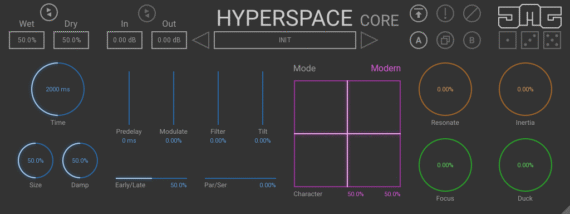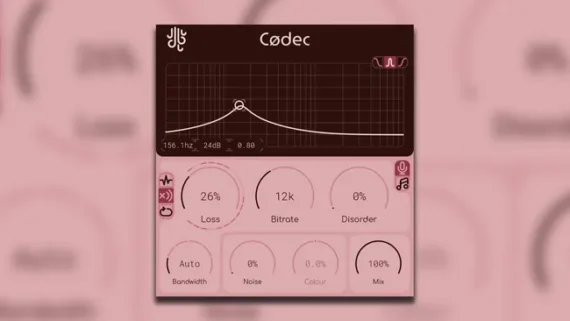New HyperspaceCore ‘The Most Powerful Free Reverb Ever’

United Plugins has released HyperspaceCore, a free reverb – based on their Hyperspace algorithmic reverb – that they call ‘The most powerful free reverb ever’.
Here’s a video demo, via Audio Toolshed:
Features:
- X-Y Pad – the XY pad lets you morph the parameters of the algorithm, such as delay times, frequencies and internal routings. This allows almost unlimited possibilities to create your own algorithm characters. Plus this can be automated for creative uses.
- Intelligent Randomization – The dice symbols are smart randomizers that dial in useful settings to give you great sounding reverbs in just one click. With 3 levels of randomness, you can use them to subtly change the character of your existing sound or unleash chaos.
- Intuitive Interface – The GUI is resizable and HDPI compatible, so it will fit perfectly on any screen.
- Smart Control – The parameters in Hyperspace offer extreme value ranges to give you the most flexibility possible while having the useful values tuned to the center of the controls, allowing you to find that sweet spot quickly. Separate controls for Wet & Dry give you control over the balance of reverb, with a link option to give you the typical mix behavior found in most other plugins. Time-based parameters can be synced to the host tempo to get predelay and decay grooving with the beat.
- CM Legacy – HyperspaceCore is a successor to the discontinued Hyperspace CM version, which was created for (late) Computer Music magazine.
- 64-bit audio quality at any sampling rate – The plugin provides the maximum audio quality you can get. It uses internal 64-bit audio processing and can handle any sampling rate. 192 kHz or even higher.
- Smart bypass – ensures that you don’t get any clicks or noises when automating the parameter. It also compensates for latency, ensuring that the bypass states are perfectly in sync with each other.
- Intelligent sleep on silence – This plugin intelligently detects whether it makes sense to perform processing at all. If not, it temporarily turns on sleep mode. In such a state, it requires virtually no CPU, to save the computing sources for other processes.
HyperspaceCore is available now as a free download for Mac & Windows. Registration is required.



